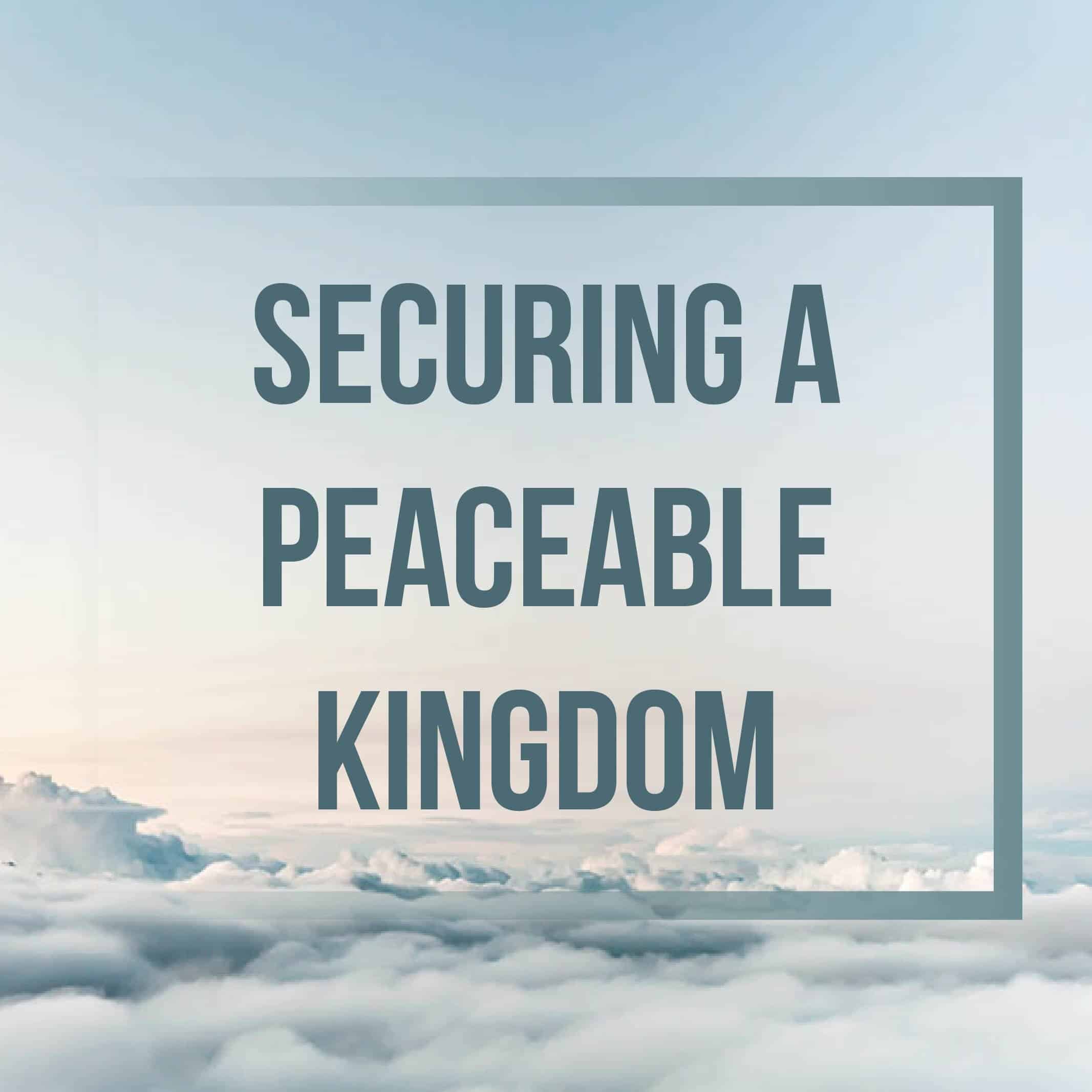Anna and I have made nearly forty trips to Israel. We have always prayed at the Western (or Wailing) Wall, but as tensions increased in 2002, I felt strongly that our emphasis was to be on an intercessory mission—to secure a barricade in the invisible realm and to extend a canopy of prayer over the Land and its people.
The call to pray for the peace of Jerusalem (Psalm 122:6) is about securing a peaceable kingdom and preserving its boundaries. Jerusalem is the only city on this planet upon which God said He has chosen to put His name (1 Kings 11:34). His Word says that if anyone comes against Jerusalem, they are coming against Him (Zech. 12:2). In fact, the end of the world as we know it and what some call the “end-time revival” centers on Jerusalem. When God starts breaking through spiritually among the Jews in the last times, it’s going to explode into a spread of His grace and power throughout the nations of the earth at dimensions unprecedented (see Heb. 11).
Why then, if we’re ultimately coming to the end, should we pray? Because there are a lot of redemptive things God is doing in the meantime to expand His goodness, not only among His ancient people, but also throughout the whole world.
And the same principles involved in praying for Israel apply to securing the boundaries of blessing that God appoints for you and me in the personal “kingdoms” which are our lives.
“Thrones are set there…”
For thrones are set there for judgment, the thrones of the house of David. (Psalm 122:5)
The word “thrones” indicates where rulership takes place. The thrones referred to here are not only literal thrones, but also poetic prophecy about the dynamics of rulership in the spiritual realm. “Jerusalem” is a double picture. There is the Jerusalem in Israel, where God has put His Name, and there is the “Jerusalem” that is you. For if you have received Jesus as your Savior, the Bible says that the Lord has put His Name on you, too (Rev. 1, 2). In Christ, we are named as the Lord’s and headed for the destiny of our eternal home in Heaven—the New Jerusalem.
In addition, to those of us who have come to know Christ as Savior, a dimension of authority has been given. He has “made us sit together in the heavenly places in Christ Jesus” (Eph. 2:6). It is as if He comes and escorts us to sit with Him in a place of rulership. Jesus’ words, “Occupy till I come” (Luke 19:13 KJV), point to our need to actively exercise our “throne rights” through prayer and intercession.
“Pray for the peace of Jerusalem…”
Pray for the peace of Jerusalem: may they prosper who love you. Peace be within your walls, prosperity within your palaces. (Psalm 122:6)
If there is to be peace, then there must be governance that makes that peace possible. The rule of God happens by His power, but it happens through His people. The Lord did not govern Anna’s and my children from the sky while we stood by and watched. We prayed and asked Him, and then did what it says in His Word, and God gave us four really good kids. “Exercising the throne” is about invoking the presence and power of God to be directed toward specific circumstances. And with that comes a personal dimension of blessing—that of fruitfulness or prosperity. While God does want to bless us in terms of our material needs, prosperity is much more than that. When we prosper in our souls, everything else takes care of itself (3 John 1:2).
On the prayer pilgrimages I have led in Israel, we built four altars based upon God’s Word to Jacob (Gen. 35). At each one we sang, worshiped, and prayed a specific focus for Israel’s peace, blessing, and preservation. The principles upon which those altars in Israel were built work the same way when you and I build them in our hearts, establishing boundaries against the Adversary and against our own human tendencies toward neglect or indulgence—against all those forces that seek to hinder God’s intended blessings and peace.
First we built the Altar of Truth. “Forever, O Lord, Your word is settled in heaven” (Psalm 119:89). The idea of “settled” is that God has set His Word in place like an officer is stationed on duty to guard something. The truth of God’s Word provides protection against those things that would intrude upon our peace, as well as freedom from that which brings ruin (John 8:32). In Israel, we prayed for hearts to be softened toward the truth of God’s Word. An altar of truth is established in our personal lives when we commit to live in the liberty of His Word.
Second was the Altar of Life. “Come from the four winds, O breath, and breathe on these slain, that they may live…I will put My Spirit in you, and you shall live, and I will place you in your own land…” (Ez. 37:9, 14) Out of a vision given to the prophet Ezekiel in which everything is dead and lost—a picture of Israel scattered from her land and treated with hostility—the Lord says that in the last days, He will begin to gather His people. The picture is of a valley of dead bones, coming together to form skeletons, and then flesh appears on the bones, into which the Lord calls for the breath of life, His Spirit, to come. Most students of Scripture agree this is a powerful picture of where Israel is right now; the bones came together when the State structure was re-established, and the flesh was the subsequent “re-peopling” of its population. There were only 600,000 people in the area of Israel at the time it became a nation in 1948. There are six million now, the majority having come from all over the world. It’s a miracle of modern times, an incredible fulfillment of prophecy.
But there is such a need in Israel for the breath of the Spirit of God to come in, just as there is for the Word. And we prayed for the Spirit of revelation to come and cause the veil to melt away, that they would see the truth and love of God and the wonderful gift of Messiah. It is the same in our personal lives. Just as heeding the Word is fundamental, an altar of openness to abide daily in the Holy Spirit is necessary for us to know the boundaries of God’s blessing in our lives.
Third was the Altar of Worship. In a culture that depended upon rain for survival, the Lord said to Zechariah, If people don’t worship Me, there won’t be rain (Zech. 14:17, paraphrased). There is a direct correlation between the physical world and the spiritual. God created man out of the dust and gave him dominion over the Earth. Things go sour in the natural realm not because God is punishing people but by reason of our neglect or failure to recognize that certain things are released only when we accept our share of responsibility.
Living daily with an altar of worship in our heart protects us from becoming entangled with other things—other gods—that distract our attention and command our allegiance. If we give place to those things, there will be no rain. And no rain means things dry up—relationships, finances, peace. With worship comes the flow of His presence. Just as His Word of Truth makes us free, and the breath of His Spirit gives us vitality, it’s God’s presence that provides adequacy.
Finally, we built the Altar of Praise. From the rising of the sun to its going down the Lord’s name is to be praised. (Psalm 113:3) Praise is different from worship. Worship is acknowledging the Lord and welcoming His presence. Praise not only exalts God because He is worthy, but also produces a dynamic means of defense. Imagine praise as a giant umbrella, protecting against intrusion and fending off the works of darkness. Let the high praises be in their mouth, and a two-edged sword in their hand (Psalm 149:6). Along with the Word, praise is also a weapon of warfare that guarantees the securing of boundaries.
It is with wisdom that we pray for the peace of Jerusalem, not only that we might see God’s great work realized in Israel, but also to secure His peaceable and fruitful kingdom in our own lives.
Copyright © 2003, 2010 by Jack W. Hayford, Jack Hayford Ministries
Our gift of this teaching article by Pastor Jack Hayford is made possible by your gracious support of the ministry. Partner with us online or call toll-free 1-800-776-8180 1-800-776-8180 to donate (outside the U.S., call 1-818-779-8525
1-800-776-8180 to donate (outside the U.S., call 1-818-779-8525 1-818-779-8525).
1-818-779-8525).



